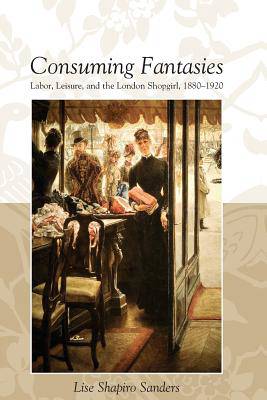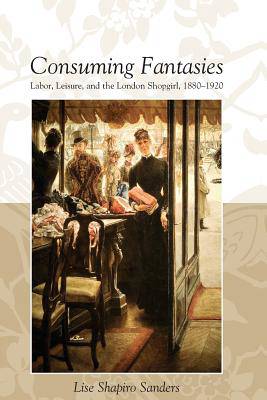
Je cadeautjes zeker op tijd in huis hebben voor de feestdagen? Kom langs in onze winkels en vind het perfecte geschenk!
- Afhalen na 1 uur in een winkel met voorraad
- Gratis thuislevering in België vanaf € 30
- Ruim aanbod met 7 miljoen producten
Je cadeautjes zeker op tijd in huis hebben voor de feestdagen? Kom langs in onze winkels en vind het perfecte geschenk!
- Afhalen na 1 uur in een winkel met voorraad
- Gratis thuislevering in België vanaf € 30
- Ruim aanbod met 7 miljoen producten
Zoeken
Consuming Fantasies
Labor, Leisure, and the London Shopgirl,
Lise Shapiro Sanders
Paperback | Engels
€ 57,95
+ 115 punten
Omschrijving
The shopgirl was the subject of popular novels, newspaper articles, and political treatises on women's work and leisure at the turn of the twentieth century. But who exactly was she, and why did she feature in so many narratives about women, sexuality, and urban life? In Consuming Fantasies: Labor, Leisure, and the London Shopgirl, 1880-1920, Lise Shapiro Sanders examines the cultural significance of the shopgirl-both historical figure and fictional heroine-from the end of Queen Victoria's reign through the First World War. As the author reveals, the shopgirl embodied the fantasies associated with a growing consumer culture: romantic adventure, upward mobility, and the acquisition of material goods. Reading novels such as George Gissing's The Odd Women and W. Somerset Maugham's Of Human Bondage as well as short stories, musical comedies, and films, Sanders argues that the London shopgirl appeared in the midst of controversies over sexual morality and the pleasures and dangers of London itself. Sanders explores the shopgirl's centrality to modern conceptions of fantasy, desire, and everyday life for working women and argues for her as a key figure in cultural and social histories of the period. This innovative interdisciplinary study makes an important contribution to research on women, class, and consumer culture and will appeal to scholars, students, and enthusiasts of Victorian and Edwardian life and literature. Lise Shapiro Sanders is assistant professor of English literature and cultural studies at Hampshire College, Amherst, Massachusetts.
Specificaties
Betrokkenen
- Auteur(s):
- Uitgeverij:
Inhoud
- Aantal bladzijden:
- 296
- Taal:
- Engels
Eigenschappen
- Productcode (EAN):
- 9780814253823
- Verschijningsdatum:
- 18/03/2016
- Uitvoering:
- Paperback
- Formaat:
- Trade paperback (VS)
- Afmetingen:
- 152 mm x 229 mm
- Gewicht:
- 435 g

Alleen bij Standaard Boekhandel
+ 115 punten op je klantenkaart van Standaard Boekhandel
Beoordelingen
We publiceren alleen reviews die voldoen aan de voorwaarden voor reviews. Bekijk onze voorwaarden voor reviews.









